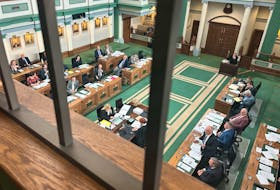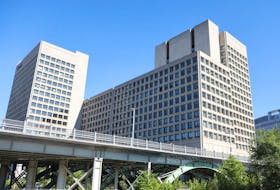HALIFAX, NS – Sweeping changes were introduced to Nova Scotia’s Education Act March 1.
Education Minister Zach Churchill announced the changes, which include removing school administrators from the Nova Scotia Teachers Union and dissolving school boards.
“This is about fixing a fractured system for the sake of our kids,” Churchill said.
The changes come in response to Dr. Avis Glaze’s recommendations, announced earlier in February, but do not include all of the changes Glaze recommended. Churchill said the decision to eliminate her suggestion of creating a College of Educators was dropped after he met directly with school administrators and determined there wasn’t enough buy-in for the idea.
He said he found the process “enlightening,” adding that protocol had previously prevented him from meeting with front-line staff in schools, instead requiring him to meet with elected board officials.
“I’ve been on the road, meeting teachers and principals directly in every single region, and there’s a couple key things in here that represent the concerned that have come forward,” he said. “There didn’t really seem to be buy-in for the College of Teachers, and that makes having a self-regulated, professional association difficult to achieve if the majority of the profession doesn’t necessary want to participate in that fashion.”
But, he said, Glaze’s objective to have “standards of excellence and leadership and teaching” will proceed and Churchill said he feels confident that administrators will “see their voice reflected in here.”
• Read the full Glaze report here
The province met with the Nova Scotia Teachers Union earlier this week following a request from union president Liette Doucet.
The NSTU had voted Feb. 20 in favour of illegal job action, with 82 per cent of the teachers who voted supporting striking. Doucet, in announcing the results the following day, implored the education minister and premier to “do the right thing” and meet with the union before introducing changes to the Education Act.
Churchill said he’s hopeful the union will ultimately support the changes.
“It matters to our kids,” Churchill said. “So, if we’re all focused on our kids and we look at the evidence – which tells us teaching excellence and leadership excellence are the two primary factors that are important to student outcomes – there is no reason we should not be able to work together to achieve this.
“Those kids bring us all together at the end of the day. We can disagree on government direction or government decisions but at the end of the day, we all have a responsibility to those kids and I’m committed to working with everybody to make sure we do that.”
Read more stories here:
• What is wrong with Nova Scotia’s school system?
• Western Nova Scotia reacts after teachers vote for illegal job action
• What could happen if the NSTU votes yes to illegal job action?
That meeting prompted a brief delay in the introduction of the bill, but on March 1, Churchill announced education reform changes that included dissolving the province’s seven English school boards, with existing board members receiving a one-time payout in March to cover the remainder of the stipend until the end of their current term in October 2020, to the tune of $2.4 million. After that, the estimated $2.3 million in annual stipends and other expenses for board members will go back into the schools, with a portion of those funds going into new School Advisory Councils.
The French board will continue to exist separately.
Read more stories here:
• Kings County reacts to current climate of education system in Nova Scotia
• ‘System problem’ behind province’s decision to dissolve seven school boards: Churchill
Existing school board offices will become “regional education centres” that will be responsible for local decisions, such as snow day closures and bussing decisions.
A 15-member provincial advisory council will be established, with representatives from all regions and diverse backgrounds represented on this council. There will also be a dedicated resource in the provincial ombudsmen’s office and a transition team will be established that includes members from varying background, the province said, to ease these changes.
School Advisory Councils will also have an enhanced role in the province, but what that will look like is not yet known. That will be developed, the province said, following discussions with existing SACs to determine what an expanded role might look like and what supports might be needed.
Principals, vice-principals removed from union
One of the key sticking points for the union – removing school administrators from the NSTU – will move ahead.
Under these changes, administrators – which includes approximately 1,000 principals, vice-principals and other people employed in managerial positions - will be removed from the union and will not have the right to strike. They will also be excluded from bargaining.
Administrators will now belong to the Public School Administrators Association, but are prohibited from forming a union of its own. The association will ensure seniority and compensation are protected and administrators will continue to have the benefits and pensions they do now. An association will be formed for these administrators, the province said, that will give them opportunities for professional development and regular opportunities to meet with government and discuss terms. Any wage increases provided to teachers will be extended to administrators as well.
There will continue to be an affiliation with the NSTU – at least for now – that will allow principals and vice-principals to opt to go back to the classroom if they choose. However, this affiliation is not for life – the administrators’ group will have the power to decide to end its affiliation with the NSTU. A vote will be held in February 2019 and, if the association with the NSTU decides to end its affiliation with the NSTU, it will happen the following August. Votes will be held every two years afterward, the province said.
Principals and vice-principals will still be permitted to teach, but the act will cap the amount of teaching time allowed at 50 per cent. That will likely mean more staff will need to be hired, especially in rural areas, where principals are often teachers. The province is estimating this could mean up to 25 to 30 full-time equivalent positions being hired.
Churchill added that he didn’t believe there would be a challenge finding teachers to fill these positions.
The changes are expected to be tabled this afternoon in the legislature.
More information on education system changes can be found at http://www.novascotia.ca/educationsystem.








